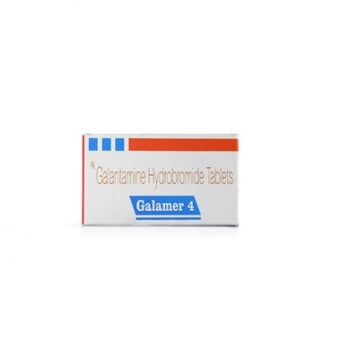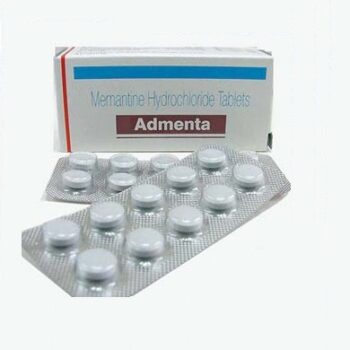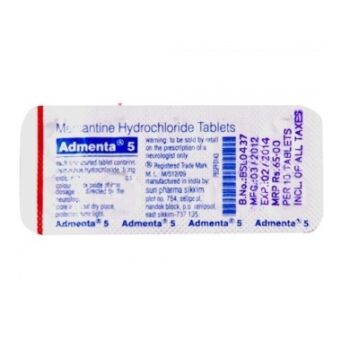Rivamer 3mg (Rivastigmine)
Rivamer 3mg contains rivastigmine, a medication used to manage symptoms of mild to moderate Alzheimer’s disease and Parkinson ‘s-related dementia. It functions by increasing levels of acetylcholine, a neurotransmitter crucial for cognitive function, aiding memory, thinking, and behavioral abilities in these conditions. Rivamer helps alleviate cognitive decline, enhancing daily functioning and quality of life.
It’s available in various forms, such as capsules and patches, offering options for individualized treatment. However, side effects like nausea, vomiting, and diarrhea might occur. Consultation with healthcare professionals is crucial for proper usage and to address any potential adverse reactions or concerns.
Rivamer 3mg (Rivastigmine) uses
Rivamer 3mg, containing rivastigmine, is primarily used to treat symptoms of mild to moderate Alzheimer’s disease and Parkinson ‘s-related dementia. It helps manage cognitive decline by increasing levels of acetylcholine in the brain, which aids in memory, thinking, and behavioral abilities in these conditions.
Rivamer is instrumental in enhancing cognitive functions and daily activities for individuals affected by these neurodegenerative disorders, improving their quality of life. Always follow healthcare professional guidance for appropriate usage and dosages tailored to individual needs
How to use Rivamer 3mg?
Rivamer 3mg is typically administered orally as prescribed by a healthcare professional. It’s advisable to start with a lower dose and gradually increase to the recommended dose to minimize side effects.
The medication is usually taken with meals to reduce stomach upset. Follow the prescribed dosage and frequency strictly, and avoid skipping doses.
For the patch form, apply it to clean, dry skin on the upper or lower back once a day, rotating the application site to prevent skin irritation. Always adhere to the guidance provided by your healthcare provider for optimal and safe usage.
How does rivastigmine 3mg work?
Rivastigmine 3mg, found in medications like Rivamer, functions as a cholinesterase inhibitor. It works by enhancing levels of acetylcholine, a neurotransmitter crucial for cognitive function.
By inhibiting the breakdown of acetylcholine in the brain, rivastigmine aids communication between nerve cells, particularly in regions associated with memory, thinking, and learning.
This action helps manage symptoms of Alzheimer’s disease and Parkinson ‘s-related dementia, temporarily improving cognitive abilities and behavior in affected individuals.
Benefits
Rivastigmine, like Rivamer 3mg, offers several benefits in managing Alzheimer’s disease and Parkinson ‘s-related dementia. It aids in preserving cognitive function and enhancing memory, thinking, and behavioral abilities.
Increasing acetylcholine levels in the brain temporarily improves cognitive symptoms and helps individuals maintain daily activities for a better quality of life.
While it doesn’t cure these conditions, it can alleviate some of their symptoms, providing crucial support for those affected by neurodegenerative diseases. Consulting healthcare professionals ensures appropriate usage to maximize these benefits.
Interactions
Rivastigmine (Rivamer 3mg) may interact with various medications. Drugs that affect heart rate, such as beta-blockers or anticholinergic medications, might have increased effects when used alongside rivastigmine. Additionally, medications that affect acetylcholine levels, like other cholinesterase inhibitors, could enhance side effects.
It’s crucial to inform healthcare providers about all medications, including over-the-counter drugs and supplements, to prevent potential interactions while using rivastigmine.
Side Effects
Common side effects of Rivamer 3mg (rivastigmine) may include nausea, vomiting, diarrhea, loss of appetite, and dizziness. Some individuals might experience stomach pain, fatigue, or muscle weakness. Skin reactions or difficulty sleeping could also occur.
Severe side effects like chest pain, irregular heartbeat, or signs of an allergic reaction require immediate medical attention. Always consult healthcare professionals if experiencing persistent or concerning side effects while using Rivamer.
Precautions
When using Rivamer 3mg (rivastigmine), several precautions are important:
- Allergies: Inform healthcare providers of any allergies to rivastigmine or similar medications.
- Medical Conditions: Discuss any medical history, especially heart conditions, stomach ulcers, seizures, or urinary problems, as rivastigmine might worsen these conditions.
- Medication Interactions: Inform about all medications, including over-the-counter drugs and supplements, to prevent potential interactions.
- Pregnancy/Breastfeeding: Consult healthcare providers if pregnant, planning pregnancy, or breastfeeding before using rivastigmine.
- Driving/Machinery: Rivastigmine might cause dizziness or drowsiness, so avoid tasks requiring focus until the effects are known.
- Dosage Adherence: Follow prescribed dosages strictly, and avoid skipping doses for optimal effectiveness.
- Side Effects Monitoring: Be vigilant for any adverse reactions and promptly inform healthcare providers if any concerns arise while using Rivamer.
Frequently Asked Questions
What is Rivamer 3mg used for?
Rivamer 3mg, containing rivastigmine, is used to manage symptoms of mild to moderate Alzheimer’s disease and Parkinson ‘s-related dementia. It aids in improving memory, thinking, and behavioral abilities in these conditions.
How does Rivamer 3mg work?
Rivamer works by increasing levels of acetylcholine in the brain, which is essential for cognitive function. It helps improve communication between nerve cells associated with memory and learning.
What are the common side effects of Rivamer 3mg?
Common side effects may include nausea, vomiting, diarrhea, loss of appetite, dizziness, fatigue, or muscle weakness. If experiencing severe or persistent side effects, consult healthcare providers.
Can Rivamer 3mg be taken with other medications?
Rivamer may interact with certain medications, so it’s crucial to inform healthcare providers about all medications, including over-the-counter drugs and supplements, to prevent potential interactions.
How should Rivamer 3mg be taken?
Rivamer is usually taken orally, with doses gradually increased to minimize side effects. The patch form is applied to clean, dry skin once daily, rotating the application site.
What precautions should be taken while using Rivamer 3mg?
Precautions include informing healthcare providers about allergies, medical conditions, pregnancy, medication interactions, and monitoring for side effects. Follow prescribed dosages and consult healthcare providers for personalized guidance.
Does Rivamer 3mg cure Alzheimer’s or Parkinson’s disease?
Rivamer doesn’t cure these conditions but helps manage their symptoms, enhancing cognitive abilities and daily functioning. It’s crucial to follow healthcare provider guidance for optimal treatment outcomes.
Conclusion
Rivamer 3mg, featuring rivastigmine, stands as a valuable aid in managing mild to moderate Alzheimer’s disease and Parkinson ‘s-related dementia. Elevating acetylcholine levels in the brain, supports cognitive function, enhancing memory and daily activities for affected individuals.
While not a cure, Rivamer’s ability to mitigate symptoms underscores its significance. Adherence to prescribed guidelines and healthcare provider advice ensures safe and effective usage for improved quality of life.










Reviews
There are no reviews yet.